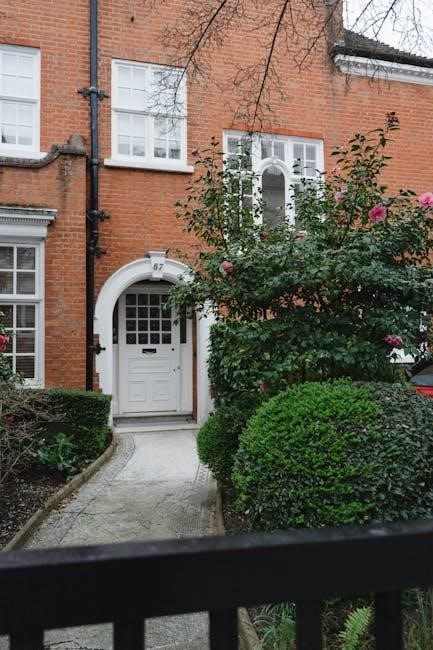Property management fee schedules outline the costs associated with managing rental properties, ensuring clarity for owners and tenants․
They typically include monthly fees, leasing charges, and maintenance costs, promoting transparency and fair compensation for services rendered․
1․1 Understanding the Importance of Property Management Fees
Property management fees are essential for ensuring that rental properties are maintained and operated efficiently․ These fees cover services like tenant screening, rent collection, and maintenance, protecting owners from potential legal and financial risks․ They also ensure compliance with local regulations and industry standards․
By understanding these fees, property owners can avoid scams and ensure transparency in their agreements․ This clarity helps build trust between owners and managers, fostering long-term partnerships and maximizing property value․
1․2 Overview of a Property Management Fee Schedule
A property management fee schedule is a detailed document outlining the costs associated with managing a rental property․ It typically includes monthly management fees, leasing fees, and maintenance costs, providing clarity for property owners․
This schedule ensures transparency and fairness, helping owners understand what they’re paying for and why․ It also protects against hidden charges, ensuring services are delivered as agreed․

Types of Property Management Fees
Property management fees vary, including monthly management fees, leasing fees, and maintenance costs, each serving distinct purposes in managing rental properties effectively․
2․1 Monthly Management Fees
Monthly management fees are recurring charges property owners pay for ongoing services like tenant screening, rent collection, and maintenance coordination․
These fees typically range from 8-12% of the monthly rent, depending on the property type and location․
- Cover routine property oversight․
- Vary based on service inclusions․
- Ensure consistent property upkeep․
They are essential for maintaining property value and tenant relations, adapting to local market conditions․
2․2 Leasing Fees
Leasing fees are one-time charges for services related to finding and securing tenants, such as marketing, tenant screening, and lease preparation․
- Cover expenses like advertising and applicant vetting․
- Often range from 50-100% of the first month’s rent․
- Ensure qualified tenants are placed efficiently․
These fees are crucial for minimizing vacancy periods and ensuring a smooth tenant placement process;
2․3 Maintenance and Repair Fees
Maintenance and repair fees cover the costs of handling property upkeep and repairs, ensuring the property remains in good condition․
- Cover routine repairs, such as plumbing or electrical issues․
- May include a markup on contractor fees for coordination services․
- Ensure timely addressing of maintenance needs to preserve property value․
These fees are essential for maintaining the property’s condition and preventing costly damages over time․

Average Property Management Fee Ranges
Average property management fees typically range between 8-12% of the monthly rent collected, varying based on property type and services included․
- National averages often fall within this range, but regional differences can influence costs․
- Single-family homes may incur lower fees, while multi-unit properties or specialized services might increase charges․
Understanding these averages helps property owners budget effectively for management services․
3․1 National Averages for Property Management Fees
National averages for property management fees typically range between 8-12% of the monthly rental income, depending on the scope of services provided․
- Percentage-based fees are common, ensuring management costs align with rental revenue․
- Additional fees may include leasing fees ($100-$300) and maintenance charges (flat rate or percentage of repair costs)․
- Transparency in fee structures is crucial for building trust between property owners and managers․
Understanding these averages helps owners budget and compare management services effectively․
Word count: 88
okay
3․2 Regional Variations in Fee Structures
Property management fees vary significantly by region due to differences in local rental rates, cost of living, and market competition․
- Urban areas like New York City often have higher fees due to increased demand and operational costs․
- Rural regions may see lower fees as property values and rental incomes are generally smaller․
- Some areas charge flat fees, while others stick to percentage-based models, reflecting local market norms․
- Regional regulations and property types also influence fee structures, ensuring they align with local economic conditions․
Understanding regional variations helps property owners compare fees effectively and make informed decisions․
Word count: 88
okay
How to Create a Property Management Fee Schedule PDF
A property management fee schedule PDF outlines all management fees clearly, ensuring transparency for property owners․ Include detailed breakdowns of monthly fees, leasing charges, and maintenance costs․ Add service descriptions to avoid confusion․ Regularly update the document to reflect market changes and ensure compliance with regional standards․
4․1 Steps to Develop a Comprehensive Fee Schedule
- Define the scope of property management services to be included in the schedule․
- Determine the fee structure, such as percentage-based or flat-rate pricing․
- List all common fees, including monthly management, leasing, and maintenance charges․
- Add detailed descriptions of each service to avoid misunderstandings․
- Include legal disclaimers and terms of agreement․
- Regularly update the schedule to reflect market changes and ensure compliance with regional standards․
4․2 Factors to Consider When Designing Your Fee Schedule
When designing a fee schedule, consider property type, market rates, and the scope of services offered․
- Assess local competition to ensure fees are competitive and fair․
- Evaluate the complexity of services, such as tenant screening or maintenance coordination․
- Account for regional variations in property management standards and costs․
- Consider the property’s size, location, and specific management requirements․
- Ensure transparency by clearly outlining all charges and avoiding hidden fees․

The Role of Property Management Fees in Rental Properties
Property management fees cover services like tenant screening, rent collection, and maintenance, ensuring smooth operations for rental properties․
They protect property owners’ investments and streamline tenant interactions, fostering a balanced relationship between owners and renters․
5․1 Impact on Property Owners
Property management fees enable owners to delegate tasks like tenant screening, rent collection, and maintenance, freeing time and reducing stress․
These fees ensure properties are well-maintained, enhancing long-term value and providing peace of mind, while protecting their investment through professional oversight․
5․2 Impact on Tenants
Tenants benefit from professional management through consistent rent collection, timely maintenance, and clear communication․
Property management fees ensure services are reliable, fostering a positive rental experience and accountability, though these costs are typically not directly paid by tenants․

Negotiating Property Management Fees
Understanding fee structures and negotiating terms can lead to fair agreements, ensuring transparency and reasonable compensation for services provided by management companies․
6․1 Tips for Negotiating with Management Companies
Researching average fees and understanding service inclusions can empower property owners to negotiate effectively with management companies, ensuring fair and transparent agreements that align with their needs and budget expectations․
6․2 Signs of Unreasonable Fee Structures
Unreasonable fee structures often include hidden charges, excessive percentages of rent collected, or high upfront costs without clear service justification․ Look for lack of transparency, such as fees not outlined in the agreement, or charges that seem disproportionately high compared to market standards․ Additionally, be wary of companies that demand payment before services are rendered or those that make it difficult to understand what services are included in the fees․
Industry Standards for Property Management Fees
Industry standards for property management fees typically range from 8-12% of monthly rent, with additional fees for services like leasing or maintenance, aligning with market norms․
7․1 Standard Fee Structures Across the Industry
Property management fees commonly range from 8% to 12% of monthly rent, with flat rates for specific services like leasing or maintenance․ Many companies also charge one-time setup fees․ Additional costs may include advertising, legal expenses, and administrative tasks․ These structures ensure transparency and align with industry benchmarks, providing a clear understanding of what services are covered․ Standardization helps property owners compare management companies effectively, ensuring fair compensation for the services provided․ This consistency is crucial for maintaining trust and clarity in the landlord-management relationship․
7․2 Understanding Fee Transparency and Disclosure
Transparency in property management fees ensures clarity for both owners and tenants, preventing disputes and fostering trust․ Companies must disclose all charges upfront, detailing services covered under each fee․ This includes management, leasing, and maintenance costs; Clear invoices and agreements outlining payment terms are essential․ Industry standards emphasize the importance of avoiding hidden fees while ensuring compliance with legal requirements․ Open communication about fee structures helps build long-term relationships and maintains accountability․ Proper disclosure also protects against potential legal issues, ensuring all parties understand their financial obligations․ Transparency is key to a fair and professional management arrangement․
Understanding property management fee schedules is crucial for transparency and effective management․ Clear fee structures ensure fair compensation for services, fostering trust and informed decision-making for all parties involved․
8․1 Key Takeaways from the Property Management Fee Schedule
Understanding property management fee schedules is essential for both property owners and tenants․ These schedules outline the costs associated with managing rental properties, including monthly fees, leasing charges, and maintenance costs․ Typically, property management fees range between 8-12% of the monthly rent, though this can vary based on services and location․ Transparency in fee structures ensures fair compensation for services rendered and helps build trust between property owners and management companies․
Key takeaways include recognizing the importance of clear communication, understanding regional variations in pricing, and verifying the legitimacy of management companies․ Always review the fee schedule carefully to avoid hidden charges and ensure alignment with your property management needs․ This approach fosters a mutually beneficial relationship and ensures effective property management․ Additionally, negotiating fees and understanding the breakdown of services can help optimize your investment returns while maintaining tenant satisfaction․ By prioritizing transparency and accountability, property owners can make informed decisions that enhance their rental property’s performance and profitability․ Always seek a detailed, written fee schedule to avoid misunderstandings and ensure clarity in financial obligations․ This ensures that all parties are aligned and that the management services provided are commensurate with the fees charged․ Finally, regular reviews of the fee schedule can help adapt to market changes and ensure continued fairness and value․ This proactive approach not only protects your investment but also strengthens long-term partnerships with your property management company․ By staying informed and engaged, property owners can navigate the complexities of fee schedules with confidence, ensuring their rental properties remain profitable and well-maintained․
8․2 Final Thoughts on Effective Fee Management
Effective fee management requires clear communication and mutual understanding between property owners and managers, ensuring transparency and fair compensation for services rendered․
Regularly reviewing and aligning fee schedules with the services provided is essential for maintaining trust, optimizing returns, and protecting investments, ultimately ensuring the profitability and proper maintenance of rental properties over time․




